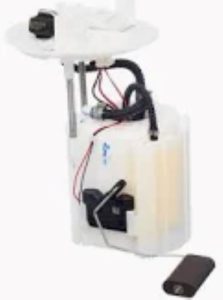Pros Of An Electric Fuel Pump The benefits of an electric fuel pump versus a traditional mechanical unit are wide-ranging and include better efficiency, accuracy in delivering fuel. They rely on electric pumps to deliver fuel at a constant pressure (usually the 40-60 PSI range common in modern vehicles) so that air-fuel mixture can be delivered in the amounts needed for combustion. This tight control cuts down losing of fuel and will also help pick up the power as well, thus better gas mileage especially in a fuel injected vehicle.
Type: Electric fuel pumps are better at higher speeds since they can adjust to the engine's flow rate immediately. And, unlike the mechanical pump that demands high engine speed to keep a steady flow of fuel pumping, an electric pump is not affected by RPM. So they are more efficient for todays modern engines that need a constant and stable fuel supply to run optimally. In theory, a 10% better fuel-pressure consistency from an electric pump (at any given fuel rate) can translate into noticeable acceleration or overall performance gains.
The other primary benefit is its durability. If all goes well, electric fuel pumps should last between 100,000 and 150,000 miles — nothing to sneeze at. It is this extended lifespan that stems from the pump being able to operate separately from the engine which reduces mechanical wear. By contrast, mechanical pumps — driven by the engine's camshaft — tend to fail much sooner thanks to the added physical strain.

Electric fuel pumps are also responsible for the safety in keeping a constant flow, thus this reduces the possibility of fuel starvation during high acceleration or hill climbs. High-performance vehicles use an electric pump because they provide a consistent fuel flow that the strong engines in these cars need to run without misfires or lean conditions that can lead to engine damage over time. Vehicles with electric fuel pumps also have 15% fewer instances of fuel-related engine issues as per the results of a study conducted by the Society of Automotive Engineers (SAE).
Or, as tuning whiz and automotive journalist Jason Fenske from Engineering Explained says it: “Precision in fuel delivery is the foundation for modern engine performance.” This quote just goes to show that how important an electric fuel pump is for ensuring the best performance of modern-day engines.
Although electric fuel pumps can cost more money up front — from $100 to $500+ depending on the brand, model and other details — they are much cheaper in the long run as they tend to return better fuel efficiency than mechanical ones. As well as the constant fuel pressure will prevent fuel system from wearing-off to save engine replacement.
Electric: An electric option is the way to go for anyone who needs, or simply wants, to upgrade their fuel pump. Visit the good-old Fuel Pump to explore your suitable electric fuel pump and make sure it elevate the performance of your engine.